Launching a social media platform can be an exciting venture but success doesn’t come from writing code alone. It starts with asking the right questions. In a digital world dominated by Instagram, TikTok, and Threads, building something truly original means understanding what your users want and what your app will stand for.
Whether you are partnering with a social media app development company in the USA or working with freelance developers, your early planning decisions shape everything from user experience to growth potential. It is all about solving real problems, promoting connection, and offering value in a crowded market.
This blog walks you through 10 crucial questions every founder or startup should ask their development team before creating a social media app. Each question uncovers key decisions that can define your app’s long-term success from platform choice to real-time engagement features.
If you are looking to work with a social media app development company in Dallas, these insights will help you align your goals with the right team.
10 Must-Ask Questions Before You Build a Social Media App
Before diving into development, it is essential to ask smart, strategic questions that will shape the foundation of your platform.
1. What makes this app different from others?
There are already many popular social media platforms available, so your app needs to offer a unique feature or benefit. This can be a distinctive feature, a fresh way to connect, or a focus on a specific community or interest group. People are more likely to try a new app if it offers an experience they cannot get elsewhere. For example, you can focus on creating a judgment-free space, a content-first platform for creatives, or a hyperlocal solution. It is important to have a clear value proposition that makes users curious and keeps them coming back.
2. What problem will the social media app solve for users?
A successful app usually solves a real problem users face. This can be the need for authentic interactions, better privacy, less clutter, or a more focused space for their interests. When you know exactly what issue your app addresses, everything becomes easier, from designing the features to marketing the product. Your app should not just be another platform, but it should give people a reason to switch or spend their time there. Whether it is reducing anxiety from algorithmic overload or helping users discover meaningful conversations, solving a real pain point builds loyalty and trust.
3. What features should be in the first version of the app?
It is tempting to add many features right away, but that can overwhelm both the users and your development team. Instead, start with the core features that reflect your app’s purpose. A clean interface, easy sign-up, user profiles, content sharing, and basic interactions such as likes or comments are usually a good foundation. These features should work smoothly and provide a positive user experience. Once the app starts gaining users, you can begin adding advanced features like live audio, stories, or marketplace integrations based on actual feedback and user behavior. Keeping things simple at the start helps avoid unnecessary delays and budget overruns.
4. How will users interact with content?
Content is the heart of any social media app. The way users engage with it shapes how connected they feel to the platform. Beyond likes and comments, modern users expect more personalized and expressive ways to interact such as emoji reactions, swipe options, voice notes, and polls. In fact, offering diverse interaction options helps keep things fun and engaging. It also encourages users to participate more often, as they have more ways to express themselves. Furthermore, rich interaction features can drive better retention, especially if they are intuitive and don’t interrupt the app’s flow.
Read Also: Make Your Own Social Media App Like MeWe: A Simple Guide
5. How will the app keep users safe?
Safety and moderation are essential for building a respectful and trusted space. Social media apps often struggle with toxic behavior, bullying, or misinformation. To create a positive environment, you should have tools that allow users to easily report, block, or mute others. Using content filters and AI-based moderation systems can help reduce harmful content before it reaches users. It is also helpful to set community guidelines that are clearly explained and consistently enforced. Additionally, giving users more control over their personal space and the ability to manage their experience adds to a sense of security and well-being.
6. Will the app work on iPhones and Android phones?
To reach a wider audience, your app should work smoothly on both iOS and Android devices. In fact, developing separate native apps for each platform can be time-consuming and expensive. Many businesses today prefer using cross-platform frameworks like Flutter or React Native, which allow developers to write a single codebase that works on both systems. These tools also make it easier to maintain a consistent design, fix bugs faster, and roll out updates to all users at the same time. A consistent experience across platforms builds trust and ensures that users don’t feel left out, no matter which phone they use.
7. Will the app have real-time features?
Real-time features bring both energy and excitement to a social media app. Whether it is live chatting, audio rooms, or real-time comment threads, these tools make the app feel alive and responsive. In fact, the users enjoy being part of things as they happen such as watching a live video and reacting instantly, or joining a group conversation during a trending topic. These features not only boost user engagement but also make your app more competitive in today’s fast-moving digital world. Though real-time tools require good backend support and fast servers, the impact on user satisfaction and activity is often worth the investment.
8. Can users control their notifications and privacy?
Everyone uses social media differently. Some people love staying in the loop, while others prefer peace. Giving users control over what notifications they get, who can see their posts, and who can contact them helps create a better overall experience. You should allow users to choose when and how they get alerts, manage visibility settings on their profiles and posts, and control friend or follower requests. These options make users feel respected and help prevent fatigue, especially in an app that encourages regular interaction. Therefore, respecting privacy builds long-term trust and can even be a key reason users choose your app over others.
9. Will the app include any fun or rewarding features?
People enjoy using apps that feel rewarding. This doesn’t always mean giving prizes, but it can be as simple as earning badges, seeing progress stats, or unlocking new features over time. These small incentives can make users feel proud of their activity and encourage them to stay active. For example, you can reward users for creating content, joining discussions, or helping others. These fun elements create a sense of progress without turning your platform into a game. They also promote healthy habits like collaboration, creativity, and positive social interactions.
10. How will users find and connect with others who share their interests?
If users can’t find like-minded people or relevant content, they will quickly lose interest. Your app should make it easy to explore topics, follow interests, and join groups or conversations that match their preferences. You can also use algorithms to suggest content or people, or create categories and tags for users to browse. The experienced media app development company in Dallas, USA, can make this process enjoyable and straightforward, helping build real communities and encouraging users to spend more time in the app. The more users feel they belong, the more likely they are to become active, long-term members.
Conclusion
Creating a social media app is more than just launching another platform. It is about understanding the people who will use it and giving them a space where they feel seen, heard, and valued. That’s why asking the right questions from the social media app developer before development is so important. When your app solves a real problem, offers features that people enjoy, and feels safe and personal, it becomes part of someone’s daily life.
With years of expertise in mobile and social media app development, ZimbleCode knows what it takes to launch an app that people love. Our team plans every element carefully, from clean UI design to cross-platform compatibility and smart backend systems.
Ready to create the next big social platform?
Schedule a free consultation with our mobile app experts.
Frequently Asked Questions (FAQs)
Q1. How long does it take to develop a social media app?
A basic version can take 3–6 months, whereas a full-featured app may take longer based on complexity and testing.
Q2. How much does it cost to build a social media app?
Costs vary widely but typically start from $20,000 and go up based on features, design, and platform.
Q3. What tech stack should be used?
Choosing the right tech stack depends on app goals, but common options include Flutter, React Native, Node.js, and Firebase.
Q4. Should I hire a freelance developer or a whole team?
Hiring a whole team offers more structure, accountability, and end-to-end support for strategy, design, and development.

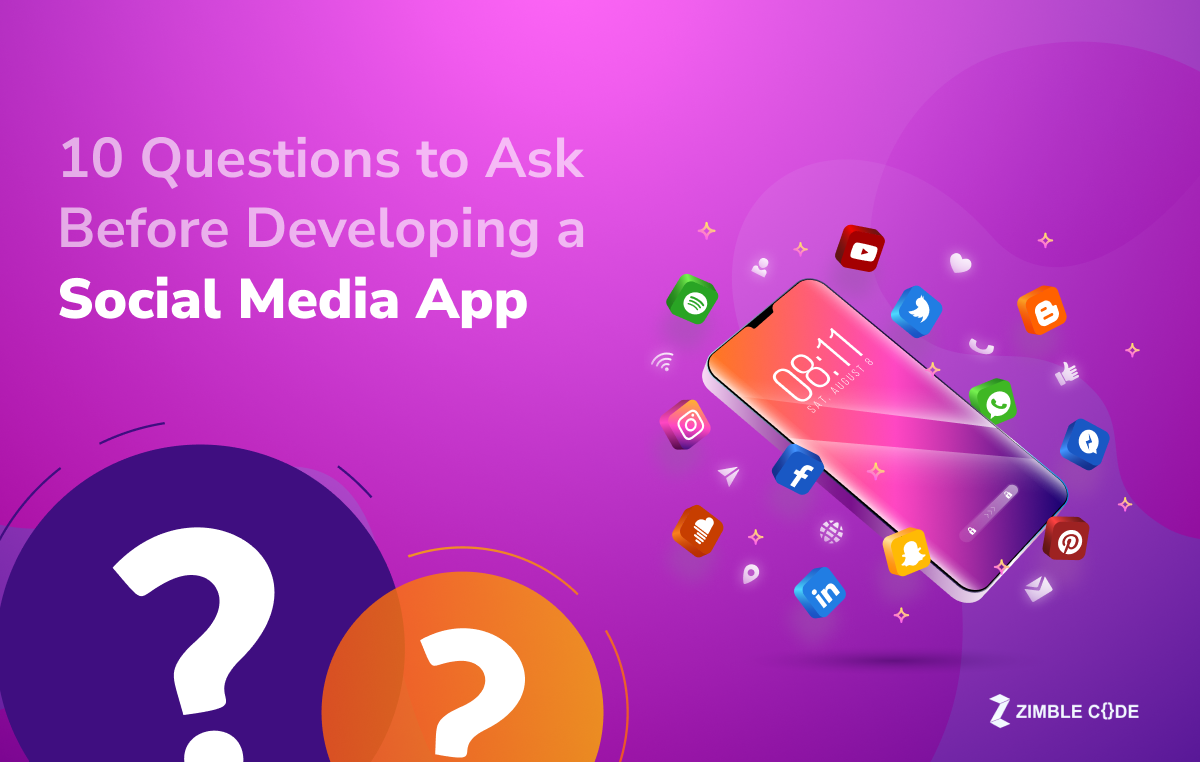




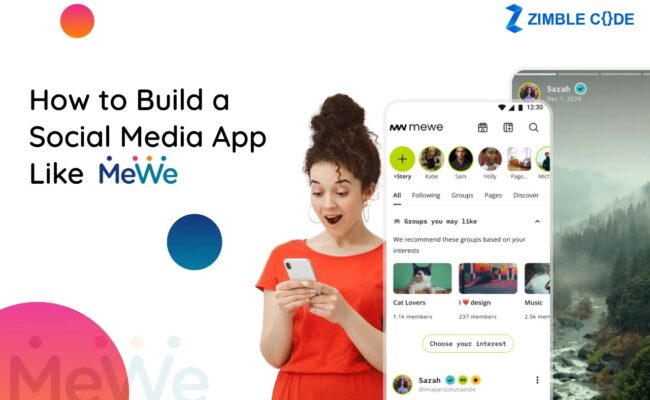
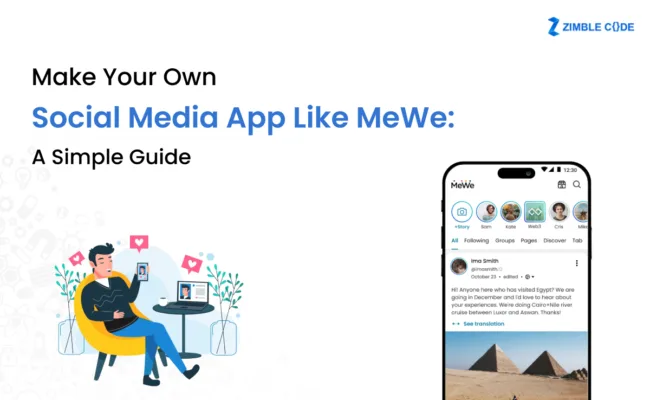
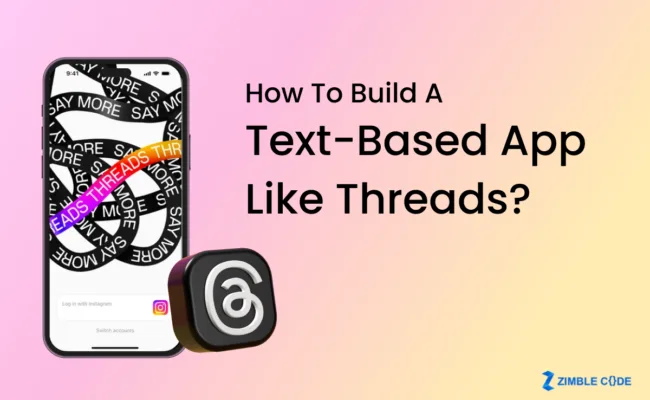
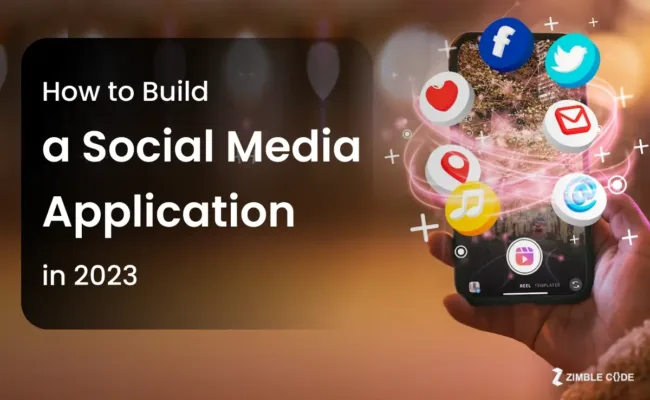
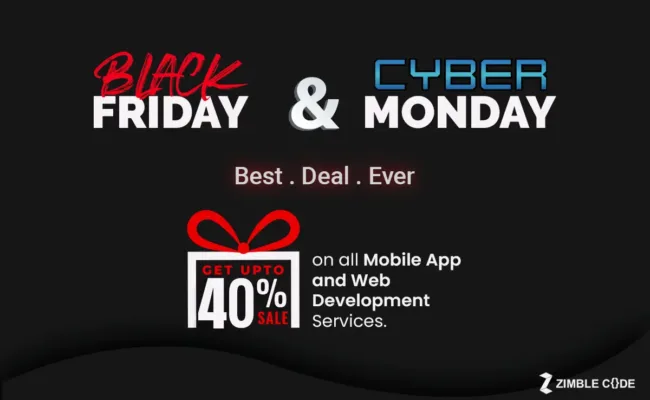

Leave A Comment